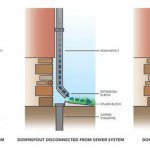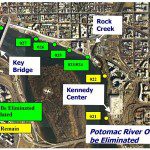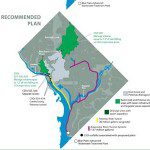As part of its Green Infrastructure Challenge initiative, DC Water is launching a program this summer to divert stormwater by connecting downspouts to rain barrels after disconnecting them from standpipes that run into the “combined sewer.” Participants would give DC Water a right-of-entry to inspect the properties about once a year to ensure downspouts remain connected to the barrels.
In an interview with The Georgetowner, Bethany Bezak, DC Water’s manager of Green Infrastructure, said the program would be optional for property owners and that properties must meet the approved criteria for installation, including “enough pervious space” to ensure no flooding. While there would be no penalty for disconnecting the rain barrels, she said, there would be a process to reconnect to the sewer, and that DC Water would ask that property owners inform them of disconnections, primarily for the sake of tracking the use of rain barrels for the Environmental Protection Agency. The rain barrel program is part of a plan modification that reduces the amount of work that will be done in the streets and public right of way to divert additional stormwater away from the combined sewer, as required in part by the EPA, Bezak said.
Set to begin mid-2017, the work in the public right of way will consist of the construction of the Potomac River Tunnel, a 23,000-foot-long gravity tunnel that will connect and consolidate six of Georgetown’s combined sewer overflow outfalls along the Georgetown Waterfront to the Blue Plains Tunnel in Anacostia. The new tunnel, along with the implementation of the Green Infrastructure initiatives, such as downspouts diverted to rain barrels, is a response to public comments. The original plan had a 4,500-foot-long tunnel, but required the highly disruptive construction of a pumping station to empty the tunnel, as well as additional capacity to the tunnel dewatering station. The simpler gravity-fed tunnel will run along the Potomac River, eliminate the need for a new tunnel dewatering pumping station and offer greater reliability, according to DC Water’s Long Term Control Plan Modification for Green Infrastructure.
The document notes that the combined sewer is an antiquated system that carries both sewage and storm runoff to a treatment plant to remove pollutants before being discharged into the Potomac. During periods of heavy rain, when the capacity of the combined sewer is exceeded, the overflow, which includes untreated sewage, is discharged directly into the Anacostia and Potomac rivers. Modern sewer systems separate sewage from rainwater. No combined sewers have been built in the District since 1900.
According to an email from Bezak, “Implementation [of the Green Infrastructure] may have impacts such as dust, noise, temporary closure of streets and alleys and temporary parking restrictions. DC Water will work closely with the community to minimize the impacts of construction,” similar to road construction projects. “DC Water is currently developing the proposed locations and types of GI [green infrastructure] for implementation. Once developed, DC Water will continue to seek public feedback. Following this process, a phased construction plan will be developed to determine which areas will be constructed first within the construction timeline.”
Jeff Jones, a member of the Georgetown-Burleith Advisory Neighborhood Commission, says that ANC2E is trying to collect more information, to find out what requirements and stipulations will go into agreeing to the program. “We want to make sure that residents understand what they are getting into,” he said.
DC Water will pay for the rain barrels, disconnection of the downspouts from the sewer and reconnection to the rain barrels, said Bezak, and that property owners will be responsible for maintenance of the rain barrels and will be provided with information on how to do so. She added that many people use the stored water for gardening and even washing cars.
Interested property owners are invited by DC Water to contact them at cleanriversgi@dcwater.com to schedule a brief audit of their property to evaluate suitability for the rain barrels or other Green Infrastructure opportunities. Anyone with questions about the program may also contact that address.
*[Editor’s Note: There will be regular updates on this massive project. Please call The Georgetowner at 202-338-4833 if you have concerns or questions.]*





